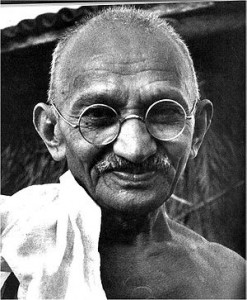
Mohandas Karamchand Gandhi (Gujarati: મોહનદાસ કરમચંદ ગાંધી; Hindi: मोहनदास करमचंद गांधी, pronounced [moːɦənd̪aːs kərəmtɕənd̪ ɡaːnd̪ʱi]; 2 October 1869 – 30 January 1948) was the pre-eminent political and ideological leader of India during the Indian independence movement. He pioneered satyagraha. This is defined as resistance to tyranny through mass civil disobedience, a philosophy firmly founded upon ahimsa, or total nonviolence. This concept helped India to gain independence, and inspired movements for civil rights and freedom across the world. Gandhi is often referred to as Gandhi first employed civil disobedience while an expatriate lawyer in South Africa, during the resident Indian community’s struggle there for civil rights. After his return to India in 1915, he organised protests by peasants, farmers, and urban labourers concerning excessive land-tax and discrimination. After assuming leadership of the Indian National Congress in 1921, Gandhi led nationwide campaigns to ease poverty, expand women’s rights, build religious and ethnic amity, end untouchability, and increase economic self-reliance. Above all, he aimed to achieve Swaraj or the independence of India from foreign domination. Gandhi famously led his followers in the Non-cooperation movement that protested the British-imposed salt tax with the 400 km (240 mi) Dandi Salt March in 1930. Later, in 1942, he launched the Quit India civil disobedience movement demanding immediate independence for India. Gandhi spent a number of years in jail in both South Africa and India.
Some of Gandhi’s audiobooks below:
An Autobiography: The Story of My Experiment with Truth
See below for some of Gandhi’s famous Quotes (Wisdom):
“Power is of two kinds. One is obtained by the fear of punishment and the other by acts of love. Power based on love is a thousand times more effective and permanent then the one derived from fear of punishment.”
“Gentleness, self-sacrifice and generosity are the exclusive possession of no one race or religion.”
“Happiness is when what you think, what you say, and what you do are in harmony.”
Wikipedia contributors. “Mohandas Karamchand Gandhi.” Wikipedia, The Free Encyclopedia. Wikipedia, The Free Encyclopedia, 11 Feb. 2011. Web. 12 Feb. 2011.
Disclaimer: This page contains affiliate links. If you choose to make a purchase after clicking a link, I may receive a commission at no additional cost to you. Thank you for your support!
Related articles
- Ghandi’s Social Network (andrewsullivan.theatlantic.com)
- Gandhi’s Humble Home Prepares for President (blogs.wsj.com)
- Why Mahatma Gandhi Did Not get Nobel Peace Prize (aronnirmal.wordpress.com)
- Gandhi a hero for entire world: Obama (ibnlive.in.com)
- Mahatma Gandhi or Father of THE Nation (socyberty.com)

Leave a Reply
Want to join the discussion?Feel free to contribute!